One of a kind 1987 Aston Martin Lagonda Shooting Brake
When an owner sets out on the journey to customize a classic car, their level of bravery can be judged against two separate criteria. The first is the make and model of the car that they have chosen to customize. The second is the style of customization they have chosen to pursue. I think that when measured against these criteria, choosing to convert an Aston Martin Lagonda into a Shooting Brake must rate as a pretty brave move. The general fit and finish of the vehicle suggest that the work has been completed to a high standard, and now is the opportunity for someone to park the Lagonda in their garage. It is located in Monterey, California, and is listed here at RM Sotheby’s. The Aston is being offered with No Reserve, but the pre-auction estimate is $150,000 – $200,000.
It has often been said that when William Towns locked himself away to design the Lagonda, he only took a piece of paper, a pencil, and a ruler with him. To that, I would probably add that he found a coin in his pocket because otherwise, the wheel openings would have finished up as sharp and square as the rest of the car’s design. Over the years, attempts were made to soften the design, and by the time that the Series 3 cars emerged, some of the sharp edges had been removed. This particular car is a Series 3, and with only 75 cars built, it is a fairly rare beast. It is also an interesting choice of vehicle on which to base a custom project. The color of the Lagonda doesn’t appear to be original, as there were no shades of grey offered by Aston at this time. It looks to be a shade called Cumberland Grey, which is quite attractive in itself. The fit and finish of the custom work look to be first-rate, but the styling looks a bit “off” to me. The design brief was to transform the Lagonda into a Shooting Brake but to retain as much of the car’s original rear-end styling as possible. The inspiration for the design was derived from the one-off Shooting Brake that was designed and built by Roos Engineering, in Safenwil, Switzerland, in 1996. While they have managed to generally achieve the styling aim, it has led to a compromise in the shape of the rear side glass, which looks out of place with the rest of the styling. That glass almost looks like an after-thought, and even makes the rear of the vehicle appear as though it is sagging slightly. Of course, that is personal opinion, and there will certainly be plenty of people who like the styling.
It is pretty hard to find fault with the interior of the Lagonda, and it is all pretty traditional Aston fare. This means that many trees and cows have made the ultimate sacrifice to provide the materials for the sumptuous interior trim. There’s probably not a lot of point in discussing the originality of the interior in a car like this, but what I will say is that it is loaded with luxury. In addition to the normal air conditioning, power windows, power seats, and cruise control, you can add a CD player, a TV and VCR for the rear passengers (concealed in a timber-fronted cabinet), and even a drinks cabinet, complete with crystal decanters and glasses.
The driver gains all of his information from a vacuum fluorescent display, while there are still plenty of soft-touch controls for various functions within the vehicle. The electronics in early Lagondas were the source of much heartache within Aston Martin. The company was teetering on the edge of bankruptcy when the design for the Lagonda was in progress. What they required was a vehicle that was relatively cheap to design, easy to manufacture, and would sell in respectable numbers. Unfortunately, on these three points, it was, it wasn’t, and it didn’t. The design was easy enough, but the development of the electronics was the stuff of nightmares. The company was committed to the development of a gas plasma display, touch-sensitive controls, and other ground-breaking electronic, causing development costs on this technology to blow out enormously. In fact, the ultimate cost for developing the electronics massively exceeded the amount that the company had budgeted for developing the entire car. To add insult to injury, these electronics also proved to be horrendously unreliable. So fraught with drama was the development, that even though the car was unveiled in 1976, and the orders rolled in, the first production car wasn’t delivered until 1978, and even that one didn’t actually run or drive. Eventually, actual production commenced in late 1978, but the car still faced many issues with the electronics throughout its life. Another indication of the sheer scale of the problems facing Aston Martin revolved around vehicle build times. While their Aston Martin V8 took around 1,200 man-hours to construct, the Lagonda took a staggering 2,200 man-hours. This meant that the company was left with no choice but to market the vehicle as a premium product. It is all of these factors that explain why the car that Aston Martin had developed as its intended volume-selling car only managed to achieve a build total of 645 cars between 1978 and 1990.
Powering the Lagonda is a fuel-injected 5,340cc DOHC V8 engine, while the engine’s 280hp finds its way to the rear wheels via a 3-speed TorqueFlite transmission. The engine in the Lagonda was shared with its sister car, the Aston Martin V8. Squeezing this engine under the hood of the Lagonda was a triumph of engineering and ingenuity because the low nose of the Lagonda not only meant that the engine had to be moved well back in the engine bay to clear that low hood, but the entire intake system also required redesigning. Many journalists found the performance of the Lagonda to be very disappointing, but Aston was quick to point out to these journalists that the Lagonda was a luxury car, and if they wanted a performance car, then they were welcome to drive an Aston Martin V8 instead. This car comes with a significant amount of documentation, including a comprehensive service history. Sotheby’s don’t indicate how well the car runs and drives, but given the amount of money the current owner will have invested into the vehicle, you would hope that it runs and drives well.
We’ve seen some pretty funky customizations here at Barn Finds over the years, but this car would appear to be in a league of its own. There can be no doubting that the fit and finish of the entire car is first-rate. However, a Lagonda is an unusual choice for a project. Having said that, a pristine and original 1987 Lagonda can be yours for around $70,000, while an average one can be had for as little as $45,000. If this car sells for around the auction estimate, then perhaps the owner has done himself a financial favor by undertaking this custom work.
Auctions Ending Soon
 2002 Subaru Impreza WRXBid Now12 hours$333
2002 Subaru Impreza WRXBid Now12 hours$333
 1975 Chevrolet Corvette ConvertibleBid Now13 hours$4,000
1975 Chevrolet Corvette ConvertibleBid Now13 hours$4,000
 1964 Ford F-100 Camper CustomBid Now14 hours$2,000
1964 Ford F-100 Camper CustomBid Now14 hours$2,000
 2006 Jeep Wrangler SportBid Now2 days$11,000
2006 Jeep Wrangler SportBid Now2 days$11,000
 1974 Datsun 260ZBid Now4 days$750
1974 Datsun 260ZBid Now4 days$750

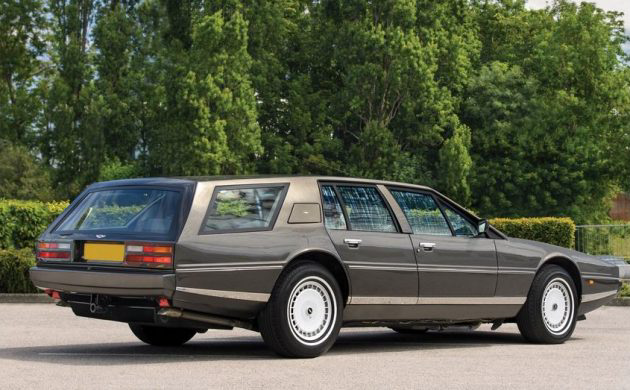
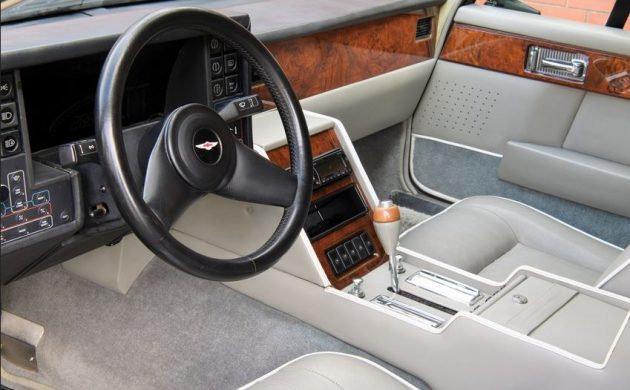
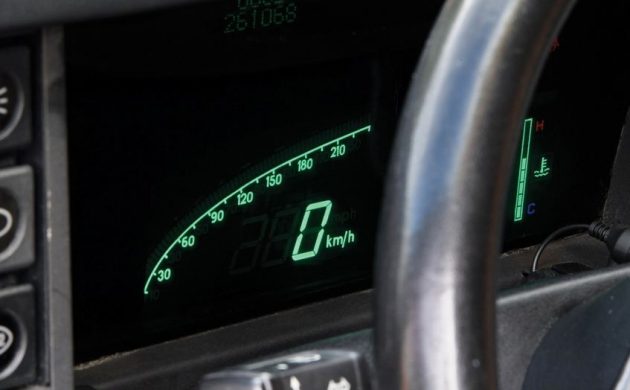

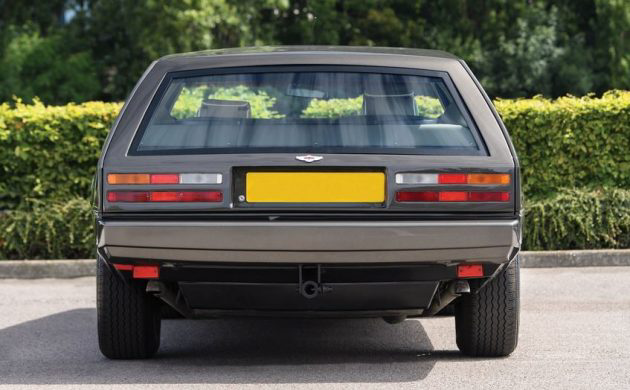

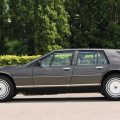

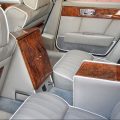
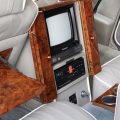
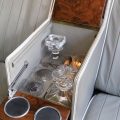

Comments
Thanks for the extensive history lesson Adam. I didn’t know much about these cars.
As for the car itself, I agree, it looks “off.” I suppose the idea was to make the rear roof line mimic to some degree the extreme slope of the hood. But for me it ends up looking out of sorts. The car’s condition and workmanship do look great.
The rear roof line appears too “tacked on”, like the early 1950,s Nash Ramblers.
I like it better this way. The sedan IMO was odd looking to start. The design always looked forced to me –like it is trying too hard to be two different cars at once. I think the designer should have taken two pieces of paper into that room and perhaps an engineer too. The color us a winner in my eyes as well. I like it.
I’d guess the designer was locked in a room with a cork board, some push pins, and a ball of string.
Would love to see this in person. They are so low and wide. Maybe the angle in the back works in person.
Love both shooting brakes and the Lagonda.
I often wonder why Aston Martin tried to be innovators? Historically they were craftsmen. More importantly why did they try and innovate in electronics? Did your research shed any light on this?
Read “Swift Running” by Peter Sprague. He Owned Aston Matin at the time, and had been involved with National Cash Register’s turnaround. His background in electronics motivated that end of the project.
If memory serves me correctly, these cars were nightmarish to maintain. Sotheby’s estimate seems laughably optimistic to me. Should it reach that, the seller would likely laugh all the way to the bank.
The back-end is too reminiscent of an AMC Gremlin.
The Gremlin would be cheaper too!
More than a couple Lagonda Shooting Brakes were commissioned by clients. This one is my least favorite. The notion that the slope of the boot lid should be mimicked in the coachbuild is, I’d say, a move of expediency as opposed to style. Keeping the C pillar intact is, however, this car’s most egregious fault.
That said, by Series 3, most of the technical issues with had dogged the Lagonda were worked out, so if you’re looking for a turn key Logonda Shooting Brake, this is one of only three Series 3 cars so converted.
On the other hand, if you’re willing to roll up your sleeves (or, more likely, pay someone to roll up their sleeves), a Series 2 car (the Series 1 was a wholly different vehicle), like the photo above, would be better option. All of the electrical gremlins introduced by trying to have a digital display in an English car of the 1970s can be addressed with modern electronics, the retrofit of which is no longer insurmountably complicated.
Somewhere along the line someone completely misunderstood the concept of “shooting break.” The original shooting break was designed as a vehicle for wealthy landowners in Great Britain to use as a hunting vehicle on their vast estates. Generally they were elongated “wagons” of Rolls Royce, Bentley, or Daimler origin used to transport hunters, shotguns, and dogs. They were never high speed sports or grand touring cars, as Astons were intended to be.
If there was ever something unattractive that i should not be attracted to (like a hot woman with a big nose) this is it. Love it
Why ruin a vehicle that was already hard to sell, looks really odd with that afterthought rear end.
No thanks.
You would think Sotheby’s would have better pictures,
Not one showing the interior of the newly added rear cargo area
Also known as the Family Truckster Wagon in that obscure film, “British Vacation”.
Just when you thought you had seen the ugliest car ever someone ups the ante.
Just watched Doug Demuro’s review of a Lagonda yesterday. She’s a bit quirky alright – the oddest part being that the odometer is not on the dash. Guess they didn’t want to advertise the miles on their car, so Aston Martin put it under the hood where only your mechanic would care to peer. Odd.
Heres that clip: https://youtu.be/QP07Jq5b88M?t=1527
Looks like an anorexic Volvo 740 wagon.
The scene in Predator when Arnold’s character comes face to face during a fight scene where the Predator takes off his protective helmet/mask and Arnold’s character says “You one ugly mutha[¥€<€/“. That was the first thing I thought when first seeing this vehicle. Some things should remain unseen. This is one of them.
I’ve always liked the design of these cars but I would not own one.
Have to agree it’s quite an achievement to make such an ugly car look even uglier.
Money and good taste do not always go hand in hand.
“Shooting” would have been the best option to put it out of its misery.